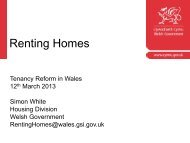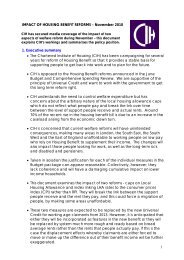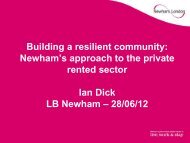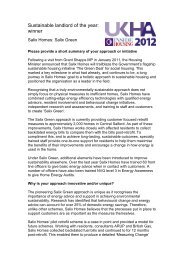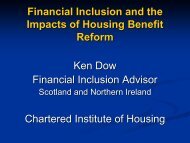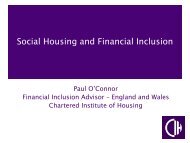View publication - Chartered Institute of Housing
View publication - Chartered Institute of Housing
View publication - Chartered Institute of Housing
Create successful ePaper yourself
Turn your PDF publications into a flip-book with our unique Google optimized e-Paper software.
PART ONE: LEARNING TODAY<br />
and quantitative problem solving for managerial leaders. This trend was reinforced by a<br />
similar concentration on the importance <strong>of</strong> planning, organisation and sequential<br />
problem solving.<br />
No one would argue that problem solving in the world <strong>of</strong> work needs this ‘left brain’<br />
approach but it is insufficient if it is not linked with ‘right brain’ thinking which will<br />
provide a more holistic approach to complex 21st Century problem solving. It is ‘right<br />
brain’ thinking which provides synthesising, integrating, intuitive and visionary<br />
approaches critical to joining up the dots in an increasingly complex world. It is this<br />
thinking which promotes new possibilities. It is the right <strong>of</strong> brain which also connects to<br />
empathy, the emotional, the interpersonal and the spiritual. ‘Right brain’ thinking is vital<br />
to any social business. It is critical to housing especially when life’s playing field is less<br />
even and issues <strong>of</strong> social justice present themselves in a challenging and seemingly<br />
intractable operating environment.<br />
The complex and challenging world <strong>of</strong> the social enterprise needs both left and right<br />
brain thinking to develop new business models and services which connect to the<br />
diverse client groups which 21st Century housing organisations serve. Sticking to the<br />
knitting <strong>of</strong> asset and housing management based on ‘left brain’ thinking is unlikely to<br />
provide for the long term sustainability <strong>of</strong> people and place.<br />
INSIGHT number four – Leaders are born…and made? Let’s not be<br />
random<br />
Much has been said and written about leadership; and whilst there have been many<br />
attempts to synthesise leadership literature, it is my direct experience <strong>of</strong> the leadership<br />
culture in housing which supports this particular insight. Firstly, there appear to be fewer<br />
‘career leaders’ (that is people who first and foremost define their role and their being<br />
as that <strong>of</strong> a leader) and more who describe their role in technical or functional terms.<br />
Secondly, expectation <strong>of</strong> being a leader appears to emerge as a consequence <strong>of</strong><br />
advancement in the workplace rather than being the goal itself. Becoming a leader,<br />
therefore, does not <strong>of</strong>ten appear to be at the forefront <strong>of</strong> the majority <strong>of</strong> people’s<br />
thinking about their role in the business. Nor is it always the organisation’s strongly<br />
expressed expectation <strong>of</strong> them.<br />
Having made the above observations there appears to be no shortage <strong>of</strong> positive role<br />
models when people are asked to identify individuals who provide positive leadership in<br />
housing. A problem arises when the same people also say they can identify greater<br />
numbers <strong>of</strong> people who act as negative role models. If we then make the assumption<br />
74



